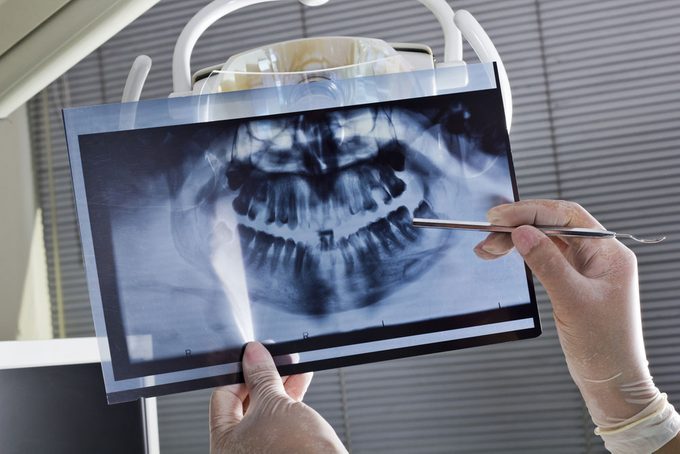5 Dental Symptoms You Should Never Ignore
Even with regular check-ups, things can go wrong when it comes to your teeth and gums. Know when to contact your dentist with these symptoms you should watch for

With regular dentist visits, we all should be able to keep on top of any problems that might affect our mouths. But that doesn’t mean we shouldn’t be aware of those symptoms that warrant a quicker appointment – especially for those of us who leave more time than we should between visits. ‘It’s not that hard for people to look in their mouths when cleaning their teeth to see if there’s anything that wasn’t there before,’ says Dr. Edmund Peters, a professor in the school of dentistry at the University of Alberta. Just keep in mind that by the time signs begin to show up in your mouth, the problem is likely advanced – so never hesitate to phone your dentist. Here’s Dr. Peters’ list of the dental symptoms you should never ignore.
Dental symptom #1: Changing gums
Gum disease includes gingivitis (inflammation of the gums) and periodontitis (a more advanced condition, which, if untreated, could lead to tooth loss) and is caused by plaque, an almost invisible, sticky film containing bacteria that can form on a clean tooth within 24 hours. With time, this plaque can harden into tartar, or calculus. The tartar can accumulate under your gum line, causing even more inflammation.
Contact your dentist if you experience these symptoms:
- Changes in colour, for instance from a normal pink colour to red or bluish-red
- Swollen gums, with a spongy feel
- Receding gums, making the teeth look larger – you may see some of the root
- Pus, odour, or new spaces forming between the teeth
Dental symptom #2: White spots on teeth
Dental decay is essentially an infection in your tooth, which starts with the hard enamel dissolving in response to acid produced by bacteria. The first signs are white spots that form in the very early stages.
When decay begins, particularly if this is happening between the teeth, you probably won’t be aware of it, which is why regular checkups, including X-rays, are so important. At this point, you may be able to stop the process before it develops into an actual cavity that requires a filling. So if you notice any white spots that weren’t there before, it’s worth getting them checked out.
Dental symptom #3: An increased sensitivity to hot and cold
Once decay moves through the enamel and into the centre of the tooth, which contains the nerves and blood vessels, you will likely begin to experience noticeable symptoms, such as a new or increased sensitivity to hot and cold or to certain foods. If this occurs, make a dental appointment immediately, as the earlier you treat a cavity, the better.
Sensitivity to hot and cold could also be a sign of less serious problems, such as teeth grinding – which you may be unaware you’re doing, especially if it happens at night – or a filling that needs to be fixed. It’s always worth mentioning this to your dentist.
Dental symptom #4: Tooth pain
Persistent tooth pain generally indicates a serious problem. Other related symptoms could include a tooth sensitive to touch or pus forming nearby – think Tom Hanks in Castaway. But keep in mind that even if the pain goes away after a day or two, you could still have a problem and should mention it to your dentist – your body may have fought off the tooth infection, but the basic problem remains, which means the infection could return.
Dental symptom #5: Changes of colour or texture in the mouth
Take the time while cleaning your teeth to look at your cheeks, your tongue and underneath your tongue to spot any changes. Basically, you’re checking for anything that wasn’t there before. Any changes of colour, such as white or red patches that aren’t going away and are getting bigger, or lumps that have formed in places which previously were smooth, should be investigated.
When you should be extra-vigilant
Many medications can make your mouth drier. That means there won’t be as much saliva, which contains antibacterial properties, to help keep infections at bay. So if you take any medication, be vigilant in watching for symptoms of trouble.
Also, as we age, the mouth becomes less resilient, so it makes sense to be more careful, especially if you’re also on daily medications. Your dentist may help your mouth stay strong by suggesting fluoride gels and rinses or mouth-wetting agents.
And remember, one of the most important things you can do is form a partnership with your dentist and dental hygienist to help you keep your mouth healthy and to pick up problems at an early stage. Pay attention to the state of your health, and mention any changes or problems as early as possible.
Don’t miss out! Sign up for our free weekly newsletters and get nutritious recipes, healthy weight-loss tips, easy ways to stay in shape and all the health news you need, delivered straight to your inbox.




